高二年级2018-2019学年度下学期期末英语试题
2018_2019学年高二英语下学期期末考试试题201912120315
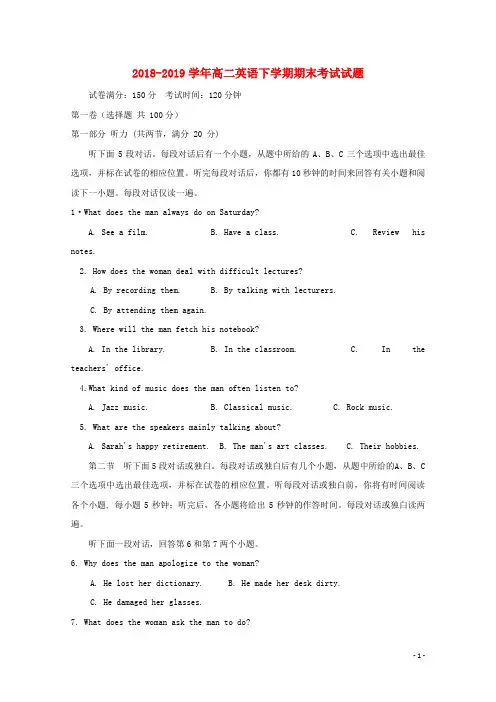
2018-2019学年高二英语下学期期末考试试题试卷满分:150分考试时间:120分钟第一卷(选择题共 100分)第一部分听力 (共两节,满分 20 分)听下面5段对话。
每段对话后有一个小题,从题中所给的A、B、C三个选项中选出最佳选项,并标在试卷的相应位置。
听完每段对话后,你都有10秒钟的时间来回答有关小题和阅读下一小题。
每段对话仅读一遍。
1·What does the man always do on Saturday?A. See a film.B. Have a class.C. Review his notes.2. How does the woman deal with difficult lectures?A. By recording them.B. By talking with lecturers.C. By attending them again.3. Where will the man fetch his notebook?A. In the library.B. In the classroom.C. In the teachers' office.4.What kind of music does the man often listen to?A. Jazz music.B. Classical music.C. Rock music.5. What are the speakers mainly talking about?A. Sarah's happy retirement.B. The man's art classes.C. Their hobbies.第二节听下面5段对话或独白。
每段对话或独白后有几个小题,从题中所给的A、B、C 三个选项中选出最佳选项,并标在试卷的相应位置。
听每段对话或独白前,你将有时间阅读各个小题, 每小题5秒钟;听完后,各小题将给出5秒钟的作答时间。
广东省深圳市2018-2019学年高二英语下学期期末考试试题(含解析)
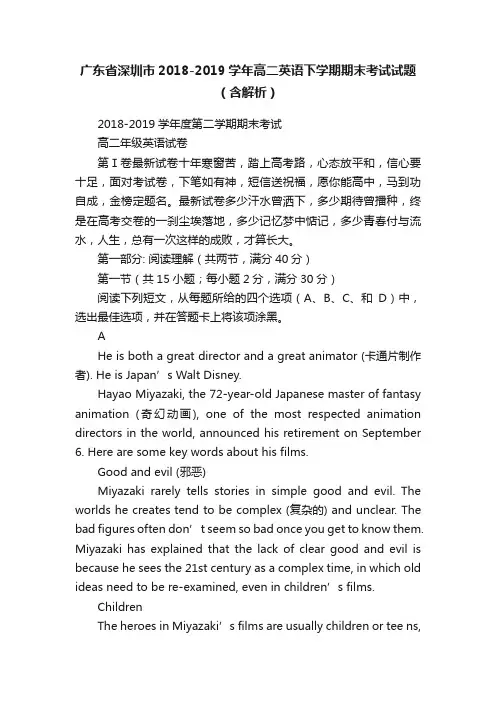
广东省深圳市2018-2019学年高二英语下学期期末考试试题(含解析)2018-2019学年度第二学期期末考试高二年级英语试卷第Ⅰ卷最新试卷十年寒窗苦,踏上高考路,心态放平和,信心要十足,面对考试卷,下笔如有神,短信送祝福,愿你能高中,马到功自成,金榜定题名。
最新试卷多少汗水曾洒下,多少期待曾播种,终是在高考交卷的一刹尘埃落地,多少记忆梦中惦记,多少青春付与流水,人生,总有一次这样的成败,才算长大。
第一部分: 阅读理解(共两节,满分40分)第一节(共15小题;每小题2分,满分30分)阅读下列短文,从每题所给的四个选项(A、B、C、和D)中,选出最佳选项,并在答题卡上将该项涂黑。
AHe is both a great director and a great animator (卡通片制作者). He is Japan’s Walt Disney.Hayao Miyazaki, the 72-year-old Japanese master of fantasy animation (奇幻动画), one of the most respected animation directors in the world, announced his retirement on September 6. Here are some key words about his films.Good and evil (邪恶)Miyazaki rarely tells stories in simple good and evil. The worlds he creates tend to be complex (复杂的) and unclear. The bad figures often don’t seem so bad once you get to know them. Miyazaki has explained that the lack of clear good and evil is because he sees the 21st century as a complex time, in which old ideas need to be re-examined, even in children’s films.ChildrenThe heroes in Miyazaki’s films are usually children or tee ns,more often young girls. Sometimes they can see the spirit world; they are curious and friendly, even to strange creatures. The stories often deal with growing up.Sky and waterTwo of Miyazaki’s great loves are the sky and water, and he uses them in re lated ways. Flight is a forever theme — Miyazaki has never done a film without flying of some kind. His imagination seems to fly and leave behind the pull of gravity (重力), a force and control that he feels a bound (束缚) from setting him free.Water is another way for Miyazaki to fight gravity. In his films he likes the unexpected floods with crystal-clear water, and objects floating on the surface seem to be supported by magic.PeaceMiyazaki’s negative view of the war goes far more than surface deep. Violence is usually seen as wrong and painful, and Miyazaki’s heroes are often peacemakers.1. What can we know about good and evil from Miyazaki’s films?A. The figures cannot be simply judged as good or evil.B. He uses his films to show good finally defeats evil.C. The complex time tends to turn good into evil.D. Children should learn to clearly tell good from evil.2. According to the article, children in Miyazaki’s films are ______.A. all little teen-aged girlsB. always able to see spiritsC. curious trouble makersD. kind to people and creatures3. Miyazaki’s love for flight may come from ______.A. the relation between sky and waterB. his hate for gravity since his childhoodC. his desire to be free from gravityD. his love for water that can flood the world4. In Miyazaki’s films w e may NOT see ______.A. the appealing castle in the skyB. children with the problems of growing upC. objects magically floating on the waterD. a world left in ruins in the end【答案】1. A 2. D 3. C 4. D【解析】本文前两段主要介绍Miyazaki和退休的消息;后面几段主要介绍了他电影中常用到的一些主题。
北京市西城区2018-2019学年高二下学期期末考试英语试卷含解析
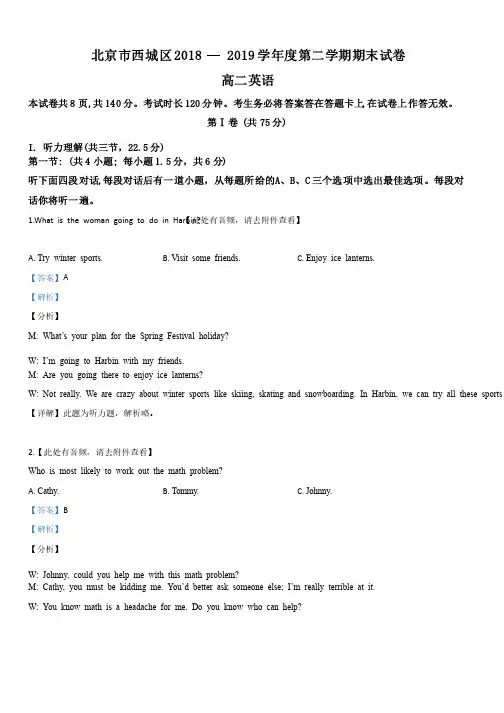
M: Well, I have to deal with a family emergency.
W: Oh, I hope everything is all right. Wish you good luck.
M: Don’t worry. I’ll just be away for several days.
听下面一段较长对话,回答以下小题。【此处有音频,请去附件查看】
9. What does the woman want the man to do?
A. Change a camera.
B. Buy some cheese.
10. What does the woman like best about smartphones?
M: That’s too bad. I heard a band was going to give a live show. It’s going to be great.
W: Oh, what a pity!
【详解】此题为听力题,解析略。
4.【此处有音频,请去附件查看】 Why is the man nervous? A. Because he’s got a stomachache. B. Because he can’t remember hliisn es. C. Because he’s afraid of going on stage. 【答案】C 【解析】 【分析】 M: I’m nervous about the play tomorrow. W: You really have nothing to worry about; you’ve spent plenty of time learning your lines. M: You’re probably right, but I’m always battling agaitnasgt e s fright.
【解析】江苏省徐州市2018-2019学年高二下学期期末考试英语试题
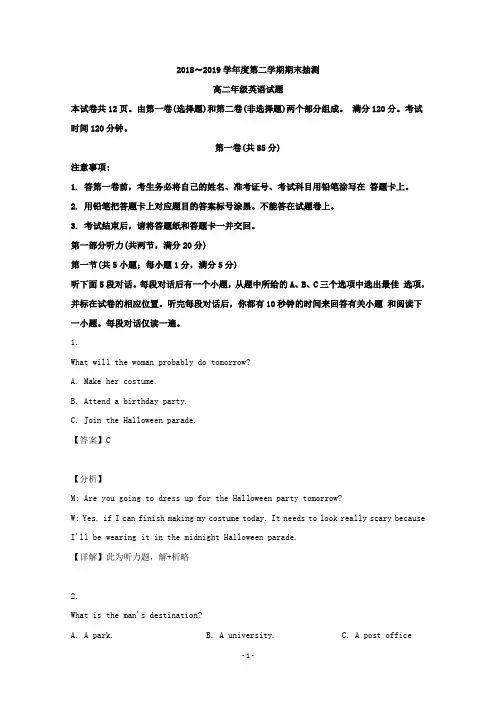
2018〜2019学年度第二学期期末抽测高二年级英语试题本试卷共12页。
由第一卷(选择题)和第二卷(非选择题)两个部分组成。
满分120分。
考试时间120分钟。
第一卷(共85分)注意事项:1. 答第一卷前,考生务必将自己的姓名、准考证号、考试科目用铅笔涂写在答题卡上。
2. 用铅笔把答题卡上对应题目的答案标号涂黑。
不能答在试题卷上。
3. 考试结束后,请将答题纸和答题卡一并交回。
第一部分听力(共两节,满分20分)第一节(共5小题;每小题1分,满分5分)听下面5段对话。
每段对话后有一个小题,从题中所给的A、B、C三个选项中选出最佳选项,并标在试卷的相应位置。
听完每段对话后,你都有10秒钟的时间来回答有关小题和阅读下一小题。
每段对话仅读一遍。
1.What will the woman probably do tomorrow?A. Make her costume.B. Attend a birthday party.C. Join the Halloween parade.【答案】C【分析】M: Are you going to dress up for the Halloween party tomorrow?W: Yes, if I can finish making my costume today. It needs to look really scary because I'll be wearing it in the midnight Halloween parade.【详解】此为听力题,解+析略2.What is the man's destination?A. A park.B. A university.C. A post office【答案】B【分析】W: Can I get a ride with you downtown? I need to get to the post office before it closes.M: I'm driving in the opposite direction, to the university. But I can drop you off at the park, and you can get on a bus there.【详解】此为听力题,解+析略3.Why did the woman decide to go to Florida for holiday?A. The flight was cheaper.B. The place was more beautiful.C. The accommodations were free.【答案】C【分析】M: I thought you said you were going to Greece for your holiday. Were the flights to Florida cheaper?W: No. We know a couple who have an apartment there, so we didn't have to spend any money for a hotel. And the weather there was beautiful.【详解】此为听力题,解+析略4.How long do the speakers need to drive altogether?A. For nine hoursB. For five hours.C. For four hours 【答案】A【分析】W: Will we reach Amsterdam today?M: Probably not. We've been driving for five hours, and we still have four hours to go. We don't need to hurry, so let's stop here.W: What a beautiful little town! Let's find a hotel and then get some dinner. 【详解】此为听力题,解+析略5.What are the speakers talking about?A. The man's sleep.B. The man's clothes.C. The man's washing machine.【答案】B【分析】W: What are you wearing? You seemed to be half asleep when you dressed yourself. The shirt doesn't match the jacket well.M: Ha-ha. I know, but they're the only clean clothes I have. I'll change when my other clothes come out of the washing machine.【详解】此为听力题,解+析略第二节(共15题;每小题1分,满分15分)听下面5段对话或独白。
2018-2019学年河南省郑州市高二下学期期末考试英语试题(含答案)
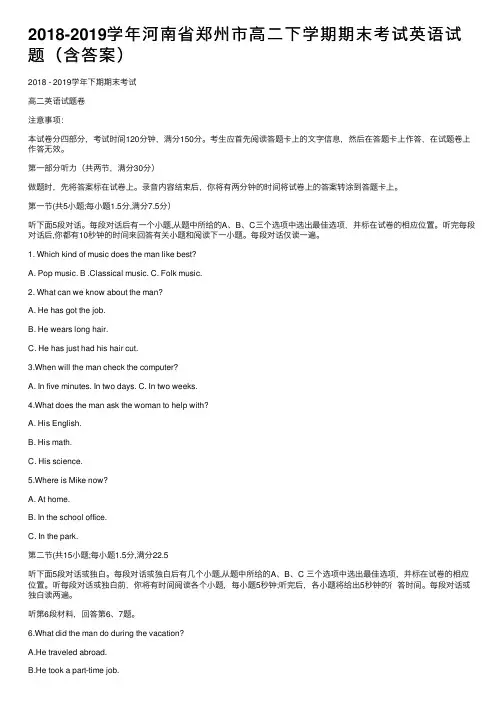
2018-2019学年河南省郑州市⾼⼆下学期期末考试英语试题(含答案)2018 - 2019学年下期期末考试⾼⼆英语试题卷注意事项:本试卷分四部分,考试时间120分钟,满分150分。
考⽣应⾸先阅读答题卡上的⽂字信息,然后在答题卡上作答,在试题卷上作答⽆效。
第⼀部分听⼒(共两节,满分30分)做题时,先将答案标在试卷上。
录⾳内容结束后,你将有两分钟的时间将试卷上的答案转涂到答题卡上。
第⼀节(共5⼩题;每⼩題1.5分,满分7.5分)听下⾯5段对话。
每段对话后有⼀个⼩题,从题中所给的A、B、C三个选项中选出最佳选项,并标在试卷的相应位置。
听完每段对话后,你都有10秒钟的时间来回答有关⼩题和阅读下⼀⼩题。
每段对话仅读⼀遍。
1. Which kind of music does the man like best?A. Pop music. B .Classical music. C. Folk music.2. What can we know about the man?A. He has got the job.B. He wears long hair.C. He has just had his hair cut.3.When will the man check the computer?A. In five minutes. In two days. C. In two weeks.4.What does the man ask the woman to help with?A. His English.B. His math.C. His science.5.Where is Mike now?A. At home.B. In the school office.C. In the park.第⼆节(共15⼩题;每⼩题1.5分,满分22.5听下⾯5段对话或独⽩。
每段对话或独⽩后有⼏个⼩题,从题中所给的A、B、C 三个选项中选出最佳选项,并标在试卷的相应位置。
学2018-2019学年高二英语下学期期末考试试题_1
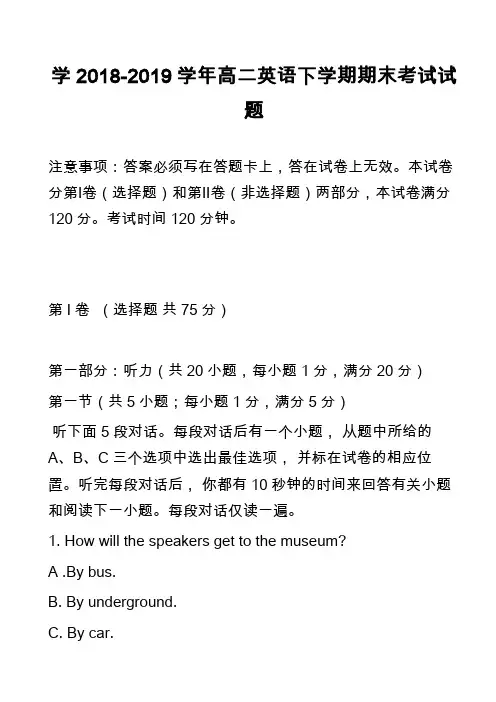
学2018-2019学年高二英语下学期期末考试试题注意事项:答案必须写在答题卡上,答在试卷上无效。
本试卷分第Ⅰ卷(选择题)和第Ⅱ卷(非选择题)两部分,本试卷满分120分。
考试时间120分钟。
第I卷(选择题共75分)第一部分:听力(共20小题,每小题1分,满分20分)第一节(共5小题;每小题1分,满分5分)听下面5段对话。
每段对话后有一个小题,从题中所给的A、B、C三个选项中选出最佳选项,并标在试卷的相应位置。
听完每段对话后,你都有10秒钟的时间来回答有关小题和阅读下一小题。
每段对话仅读一遍。
1. How will the speakers get to the museum?A .By bus.B. By underground.C. By car.2.What will the woman do tomorrow afternoon?A. Work in the office.B. Stay at home.C. Call the company.3.Where is the picture now?A. On the ground.B. On the wall.C. On the table.4.Why will Sam come to Boston?A. To take up a new position.B. To visit Boston offices.C. To take a vacation.5.What is the man doing?A. Filling in a form.B. Playing tennis.C. Having an interview.第二节(共15小题;每小题1分,满分15分)听下面5段对话或对白,每段对话或独白后有几个小题,从题中所给的A、B、C三个选项中选出最佳选项,并标在试卷的相应位置,听每段对话或独白前,你将有时间阅读各个小题。
每小题5秒钟;听完后,各小题给出5秒钟的作答时间。
学2018-2019学年高二英语下学期期末考试试题_8
学2018-2019学年高二英语下学期期末考试试题第一部分:听力(共两节,满分30分)做题时,先将答案标在试卷上。
录音内容结束后,你将有两分钟的时间将试卷上的答案转涂到答题卡上。
第一节(共5小题;每小题1.5分,满分7.5分)听下面5段对话。
每段对话后有一个小题,从题中所给的A、B、C三个选项中选出最佳选项。
听完每段对话后,你都有10秒钟的时间来回答有关小题和阅读下—小题。
每段对话仅读一遍。
例:How much is the shirt?£19.15. B. £9.18. C. £9 .15.答案是C。
1. What do we know about John?A. He won’t wait for the woman.B. He won’t come home today.C. He won’t be on time for dinner.2. What does the boy still need to do?A. Hang up his clothes.B. Put away his toys.C. Sweep the floor.3. Why is the woman sad?A. She lost her homework.B. The man deleted her essay.C. She forgot to send some emails.4. How much did the woman save?A. $9.B. $44.C. $53.5. What did the woman study in college?A. Business.B. Art.C. Spanish.第二节(共15小题;每小题1.5分,满分22.5分)听下面5段对话或独白。
每段对话或独白后有几个小题,从题中所给的A、B、C三个选项中选出最佳选项。
听每段对话或独白前,你将有时间阅读各个小题,每小题5秒钟;听完后,各小题将给出5秒钟的作答时间。
吉林省吉林市2018_2019学年高二英语下学期期末考试试题(含解析)
吉林省吉林市2018-2019学年高二英语下学期期末考试试题(含解析)第一部分听力(共两节,满分30分)第一节(共5小题;每小题1.5分,满分7.5分)听下面5段对话。
每段对话后有一个小题,从题中所给的A、B、C三个选项中选出最佳选项,并标在试卷的相应位置。
听完每段对话后,你都有10秒钟的时间来回答有关小题和阅读下一小题。
每段对话仅读一遍。
1. What does the man think of the milk?A. It's overdue.B. It's cheap.C. It’s good.2. What will the woman do next?A. Eat fish.B. Have an exam.C. Cook food.3. Where does the conversation take place?A. At a restaurant.B. At a store.C. At a theatre.4.What are the speakers talking about?A. A dish.B. A school.C.A TV programme.5. What is the probable relationship between the speakers?A. Customer and customer service.B. Boss and secretary.C. Teacher and student. 第二节(共15小题;每小题1.5分,满分22.5分)听下面5段对话或独白。
每段对话或独白后有几个小题,从题中所给的A、B、C三个选项中选出最佳选项,并标在试卷的相应位置。
听每段对话或独白前,你将有时间阅读各个小题,每小题5秒钟;听完后,各个小题将给出5秒钟的作答时间。
每段对话或独白读两遍。
听第6段材料,回答第6、7题。
6. How does the woman feel about the man's lateness?A. Unhappy. B Calm. C. Anxious.7. What does the man mean?A. He likes Western dinner.B. He wants to watch the World Cup.C It's up to the woman’s choice totally.听第7段材料,回答第8至10题8. Why does the man meet the woman?A. To edit his paper.B. To hand in the paper.C. To choose a theme.9. What's the paper related about?A. Nonverbal Communication.B. Oral English teacher.C. Character Studies.10. Who is Mary?A. Tom’s schoolmate.B. Tom’s teacher.C. Tom's col league.听第8段材料,回答第11至13题。
人教版2018-2019学年第二学期高二期末考试英语试卷
2018-2019学年第二学期高二期末考试英语试卷(考试时间:120分钟试卷满分:150分)第1卷(选择题,共100分)第一部分听力(共两节,满分30分)第一节(共5小题;每小题15分,满分75分)听下面5段对话。
每段对话后有一个小题,从题中所给的A、B、C三个选项中选出最佳选项,并标在试卷的相应位置。
听完每段对话后,你都有10秒钟的时间来回管有关小题和阅读下面小题,。
每段对话仅读一遍。
1. What probably is the woman?A. A waitressB. A secretaryC. A saleswoman2. What is the woman probably going to do?A. Take exerciseB. Give a speechC. Go out for a walk3. How's the weather now?A. Rainy.B. CloudyC. Sunny.4. How much does each ticket cost?A.3.60 pounds.B.4.60 pounds.C.7.20 pounds.5. What can we learn from the conversation?A. The woman doesn't like pop music.B. The man doesnt't like pop musicC. The woman is quite young第二节(共15小题:每小题15分,满分22.5分)听下面5段对话或独白。
每段对话或独白后有几个小题,从题中所给的A、B、C三个选项中选出最佳选项,并标在试卷的相应位置,听每段对话或独白前,你将有时间阅读各个小题,每小题5秒钟:听完后,各小题将给出5秒钟的作答时间,每段对话或独白读两遍。
听第6段材料,回答第6-7题6. Why did Mr,Carter go to Los Angeles?A. To visit a friendB. To attend a meetingC. To have a vacation.7. When does the man want to discuss the new market with Mr. Carter?A. Next Tuesday morning.B. Next Tuesday afternoon.C. Next Thursday afternoon. 听第7段材料,回答第8-10题8. Why does the man need his notebook?A. To study about the show.B. To study for the test.C. To write notes in9. When does the conversation take place?A. Before the showB. During the show.C. After the show10. What will the two speakers do after the show?A. Have dinner togetherB. Go to the man's homeC. Go to the woman's home 听第8段材料,回答第11-13题,11. How many days has the man got for his vacation?A. 25 daysB. 15 daysC. 10 days12. Why does the man go to Hawaii for his vacation with his family?A. To broaden his visionB. To relax themselvesC. To visit friends13. Where is the woman going this summer?A. EgyptB. Canada.C. The United States听第9段材料,回答第14-17题14. When did the fight happen?A. At 7B. At 11C. At 1215. What did the young man take?A. A clockB. A mobile phoneC. A shelf16. Who was injured in the fight?A. A young manB. The womanC. The shopkeeper.17. What does the man want to do now?A. Look for the young man.B. Go shopping.C. Help the woman.听第10段材料,回答第18-20题。
2018-2019学年高二下学期期末考试英语试题 Word版含答案
姓名,年级:时间:铜仁一中2018—2019学年度第二学期高二期末考试英语试题考试时间为120分钟,满分为150分。
第一部分听力(共两节,满分30分)第一节(共5小题;每小题1。
5分,满分7.5分)请听下面5段对话,选出最佳选项。
1。
What is the man doing now?A。
Answering the phone. B. Having a bath。
C. Cooking supper。
2。
What does the woman mean?A。
She needs more time to fix the iPad.B. She doesn’t know how to fix the iPad。
C. The man can have his iPad back by tomorrow。
3。
What do we know about the woman?A. She got a pay raise recently.B. S he hasn’t been feeling well recently.C. She has been late for work quite often recently.4。
How many foreign languages does the man speak?A。
3。
B. 4. C. 5.5. What does the man think of the woman?A。
Considerate B。
Careless C。
Rude第二节(共15小题;每小题1。
5分,满分22。
5分)请听下面5段对话或独白,选出最佳选项.请听第6段材料,回答第6、7题.6.Where is the woman now probably?A。
In a hotel。
B. In a restaurant C。
In a coffee bar。
7. What does the wo man want?A. One egg, some bread and a glass of milk。
- 1、下载文档前请自行甄别文档内容的完整性,平台不提供额外的编辑、内容补充、找答案等附加服务。
- 2、"仅部分预览"的文档,不可在线预览部分如存在完整性等问题,可反馈申请退款(可完整预览的文档不适用该条件!)。
- 3、如文档侵犯您的权益,请联系客服反馈,我们会尽快为您处理(人工客服工作时间:9:00-18:30)。
高二年级2018-2019学年度第二学期英语期末试题试题总分:150分考试时间:120分钟第一部分听力(共两节,满分30分)第一节(共5小题;每小题1.5分,满分7.5分)听下面5段对话。
每段对话后有一个小题,从题中所给的A、B、C三个选项中选出最佳选项,并标在试卷的相应位置。
听完每段对话后,你都有10称钟的时间来回答有关小题如阅读下一小题。
每段对话仅读一遍。
1. What does the woman say about the World Cup?A. She has no interest in it.B. The ticket is too dear.C. It's not worth seeing.2. Who will go to KTV?A. The speakers.B. Patty and Avery.C. The woman and Avery.3. What is the woman?A.A teacher.B. A doctor.C. A shop assistant.4. What are the speakers mainly talking about?A.A team.B. A game.C. A goal.5. How much will the woman pay?A. $800.B. $500.C. $30.第二节(共15小题:每小题1.5分,满分22.5分)听下面5段对话或独白。
每段对话或独白后有几个小题,从题中所给的A、B、C三个选项中选出最佳选项,并标在试卷的相应位置。
听每段对话或独白前,你将有时间阅读各个小题,每小题5秒钟;听完后,个小题将给出5秒钟的作答时间。
每段对话或独白读两遍。
听第6段材料,回答6、7题。
6. What's the relationship between the speakers?A. Fellow students.B. Co-workers.C. A couple.7. What season is it now?A. Spring.B. Autumn.C. Winter.听第7段材料,回答第8、9题。
8. What do we know about the woman?A. She stayed in London for 2 years.B. She knows a lot about the newspaper.C. She is good at sports.9. Why did the woman give up her first job?A. She was poorly paid.B. She wanted a higher positionC. She went to live in another city.听第8段材料,回答第10至12题。
10. Why can't the woman pick the man up at the station?A. She has to work.B. She can't find a taxi.C. She will meet her teacher.11. Why does the woman ask the man to get off at the golf course?A. They will play golf together.B. The pathway is tough for the taxi to go.C. It is the nearest place from her home.12. When will the speakers meet?A. At 12:00 noon.B. At about 12:30 pm.C. At around 8:00 pm.听第9段材料,回答第13至16题。
13. How often are Martin's wildlife programs on?A. Once a day.B. Once a week.C. Once a month.14. Where were the wildlife programs filmed in the early 1960s?A. In the mountains.B. On the island.C. In the local zoo.15. What did the Head of Programs think of Martin's idea of filming in Africa at first?A. Great.B. Boring.C. Ridiculous.16. What is the feature of today's filming?A. It is strictly planned.B. The scenes are uncertain.C. It takes less time to prepare.听第10段材料,回答第17至20题.17. What is the passage mainly about?A. The history of hostels.B. The development of hostels.C. The reasons for the popularity of hostels.18. By whom were hostels mostly used years ago?A. Hikers.B. Business travelers.C. Older tourists.19. How did the economic crisis influence hostels?A. It brought down the price.B. It increased the business.C. It promoted the better services.20. What does the speaker say about modern hostels?A. Their services are various.B. Most of them are located in the countryside.C. They provide cheap plane tickets for the customers.第二部分阅读理解(共两节,满分35分)第一节(共10小题;每小题2.5分,满分25分)阅读下列短文,从每题所给的A、B、C和D四个选项中,选出最佳选项,并在答题纸上将该项涂黑。
AFacebook means never having to say goodbye. The social media web site has earned a reputation forreconnecting old friends. Last week, a guy whom I hadn't seen since my graduation party five years ago sent me a friend request. I accepted and waited for him to send me a greeting of some kind. He had sought me out, after all.I learned from his profile(简介) that he was in a relationship and had a son. However, I'm pretty sure we won’tever write wall-to-wall, let alone e-mail each other. But he'll remain a friend of online until one of us makes a point of removing the other from his official list.My pool of friends consists of family members, college buddies, co-workers from past and present, and friends of friends. There are 35 in all. If I spent some time uploading old e-mail addresses, I'm confident that I could increase my friend count actually.A person could make a mission out of reconnecting with childhood friends, former classmates, distant cousins, and those one would like to get to know better. And some people can even handle hundreds of on-screen relationships, keeping up with the daily happenings of their small army of companions. After all, there are worse fates than having too many friends.Thanks to e-mail, the inability to schedule face-to-face meetings no longer means a friendship must come to a close. But even with e-mail, people will lose touch if one or both parties stop writing back. That's normal. People move from school to school, job to job, city to city. You never have to feel guilty for breaking away.Every day, the masterminds of Web 2. 0 find new ways of making human communication easier. However, convenience can be a crutch. Some things shouldn't be simplified. When it comes to friendship, there can be no shortcuts.21. According to Paragraph l, the web site is famous because _______.A. it has an interesting name of “Facebook”B. it helps people get in touch with old friendsC. it can send people a greeting of some kindD. it reminds people of events in the past22. Which of the following statements is NOT true?A. There are 35 people in the author's list of friends right now.B. The author communicates with all the 35 friends by e-mails.C. The list of 35 friends doesn't include the old e-mail addresses.D. It is not difficult for the author to increase his friend count.23. What does the author think of the convenience of communicating on line?A. The technology could not keep true friendship forever.B. The social web site of Facebook means nothing at all.C. There will be no ways of making real friends on line.D. People will not lose friends with the help of the Facebook.BHave you ever noticed what happens to an idea once you express it? Just talking about it or writing it down causes you to make it clear in your own mind. How can you use this to increase your brain power? Start writing.By putting thoughts into words, you are telling yourself the logic(逻辑)behind what you think, feel, or onlypartly understand. Often, explaining a thought is the process of understanding. In other words, you increase your brain power by exercising your “explain power.”Try this experiment. Explain how you’ll increase your brain power, even if you have no idea how right now. Just start with anything, and create an explanation. For example, start with “I’ll learn chess,” or “I’ll read an articleon the mind every week.” Explain how that will help. You’ll be surprised how often this becomes a workable plan, and if you actually do this, you’ll have a better understanding of your b rain from now.Another benefit of writing is that it helps you remember. Many, if not most, highly productive people are always taking notes. You can try keeping it all in your head, but if you keep a journal of your ideas the next time you’re working on a big project, you’ll probably have more success.Want to understand a topic? Write a book about it. That’s an extreme example, but if you are learning something new, write a letter to a friend about it, and you will understand it better. Want to invent something? Write an explanation of the problem, why you want to solve it, and why it is worth solving, and you’re half-way there.Writers don’t always write because they clearly understand something beforehand. Often, they write about something because they want to understand it. You can do the same. Writing will help bring you to an understanding. Give it a try.24. What would be the best title for the text?A. A Way on How to Write.B. Increase Your Brain Power through Writing.C. Brain Power Helps Improve Your Writing.D. How to Start Your Writing.25. If a writer writes something, it means that he or she .A. has understood it very wellB. needs to understand it betterC. wants to remember it in his or her mindD. is exercising his or her “explain power”26. The underlined sentence “you’re half-way there” in the fifth paragraph implies that.A. you are already successfulB. you still need to work hardC. writing can help you walk half wayD. writing is important to solve problems27. What’s the main purpose of the writer writing the text?A. To advise readers to start their writing.B. To explain the importance of writing.C. To persuade readers to become writers.D. To increase readers’ brain power.C"Reduce, reuse and recycle, this familiar environmentalist slogan tells us how to reduce the amount of rubbish that ends up in landfills and waterways.The concept is being used to deal with one possibly dangerous form of waste – electronic junk , such as old computers, cell-phones, and televisions. But this process for managing e-waste may be used in an immoral way more often than not used, a recent report suggests.“A lot of these materials are being sent to developing nations under the excuse of reuse – to bridge the digital divide,” said Richard Gutierrez, a policy researcher.One of the problems is that no one proves whether these old machines work before they hit the seaways. Because of this, the report says, e-waste is a growing problem in Lagos, Nigeria, and elsewhere in the developing world. Much of the waste ends up being thrown away along rivers and roads. Often it’s picked apart by poor people, who may face dangerous exposure to poisonous chemicals in the equipment.Businessmen also pay workers a little money to get back materials such as gold and copper. This low-tech recovery process could expose workers and the local environment to many dangerous materials used to build electronics. According to Gutierrez, this shadow economy exists because the excuse of recycling and reusing electronics gives businessmen “a green passport” to ship waste around the globe. “Developing nations must takeupon s ome of the responsibility themselves,” Gutierrez said. But, he added, “A greater portion of this responsibility should fall on the exporting state.”China, for example, has become a dumping place for large amounts of e-waste. The nation is beginning to take action to stop the flow of dangerous materials across its borders. The Chinese government, after many years of denial, is finally beginning to take the lead.28.What does the fourth paragraph mainly discuss?A. Old computers and TVs still work before they are sent abroad.B. Poor people break up e-waste to collect some valuable materials.C. A lot of e-waste is reused in developing countries.D. The problem of e-waste is growing in developing countries.29. It can be inferred from the last paragraph that _______.A. China has hidden a large amount of e-waste in many secret placesB. China has greatly changed her idea about the problem of e-wasteC. China has prevented poisonous materials from entering China for a long timeD. China is falling behind other countries in dealing with e-waste30. The passage mainly tells us that _______.A. developing countries are facing serious environmental problemsB. e-waste is a growing problem in developed countriesC. e-waste is sent to developing countries under the excuse of reuseD. developing countries are making full use of e-waste第二节(共5小题;每小题2分,满分10分)根据短文内容,从短文后的选项中选出能填入空白处的最佳选项。
